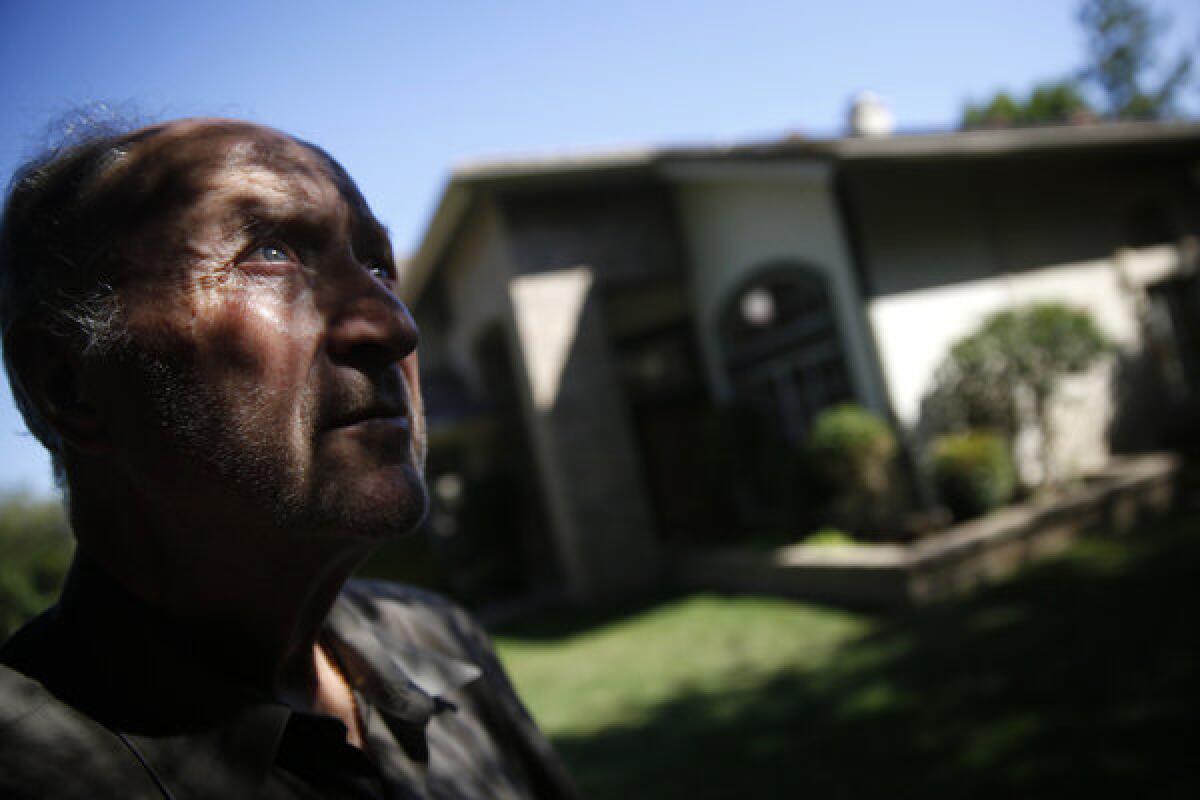Jim Thorpe, Pa., fights to keep its namesake
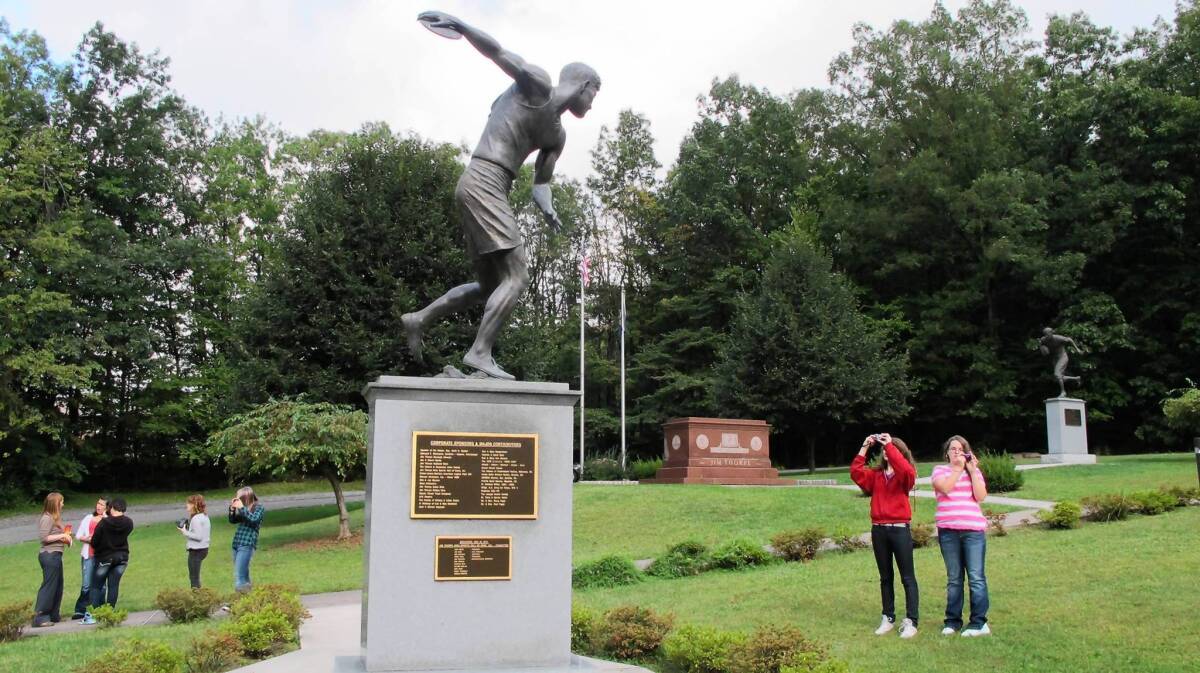
Family members want to return the Olympic athlete’s remains to the Oklahoma reservation where he grew up. But the town wants to keep Jim Thorpe in Jim Thorpe.
- Share via

W
hen the Olympic gold medalist Jim Thorpe died in 1953, his children held a traditional Indian burial ceremony on the Sac and Fox Reservation in Oklahoma. Mourners shared a meal as the great athlete's body lay in full view inside a lodge.
The ceremony came to an abrupt halt when Thorpe's widow, Patsy Thorpe, barged in. Accompanied by state troopers and a funeral hearse, she seized the body and drove away.
"It was a complete shock to all of us," recalled William Thorpe, the athlete's 85-year-old son, who was there that day. "We are all set to bury Dad in Oklahoma and then — boom! — he was gone, never to be returned."
Patsy Thorpe, Jim's third wife, had cut a deal with two struggling towns in Pennsylvania: If they would merge and rename themselves Jim Thorpe and build a memorial to honor him, she would present them his remains for burial. Thorpe had never set foot in the borough; he was born in Oklahoma in 1888 and raised on the Sac and Fox Reservation.
William Thorpe says the town of Jim Thorpe has done a wonderful job caring for his father's grave.
"But it's time for my dad to come home," he said.
Thorpe, along with a brother and the Sac and Fox Nation, prevailed in April in a federal lawsuit demanding that the town return his father's body for burial on the Oklahoma reservation. A federal judge ruled that the town was subject to the 1990 Native American Graves Protection and Repatriation Act, which governs the return of human remains and other Indian artifacts.
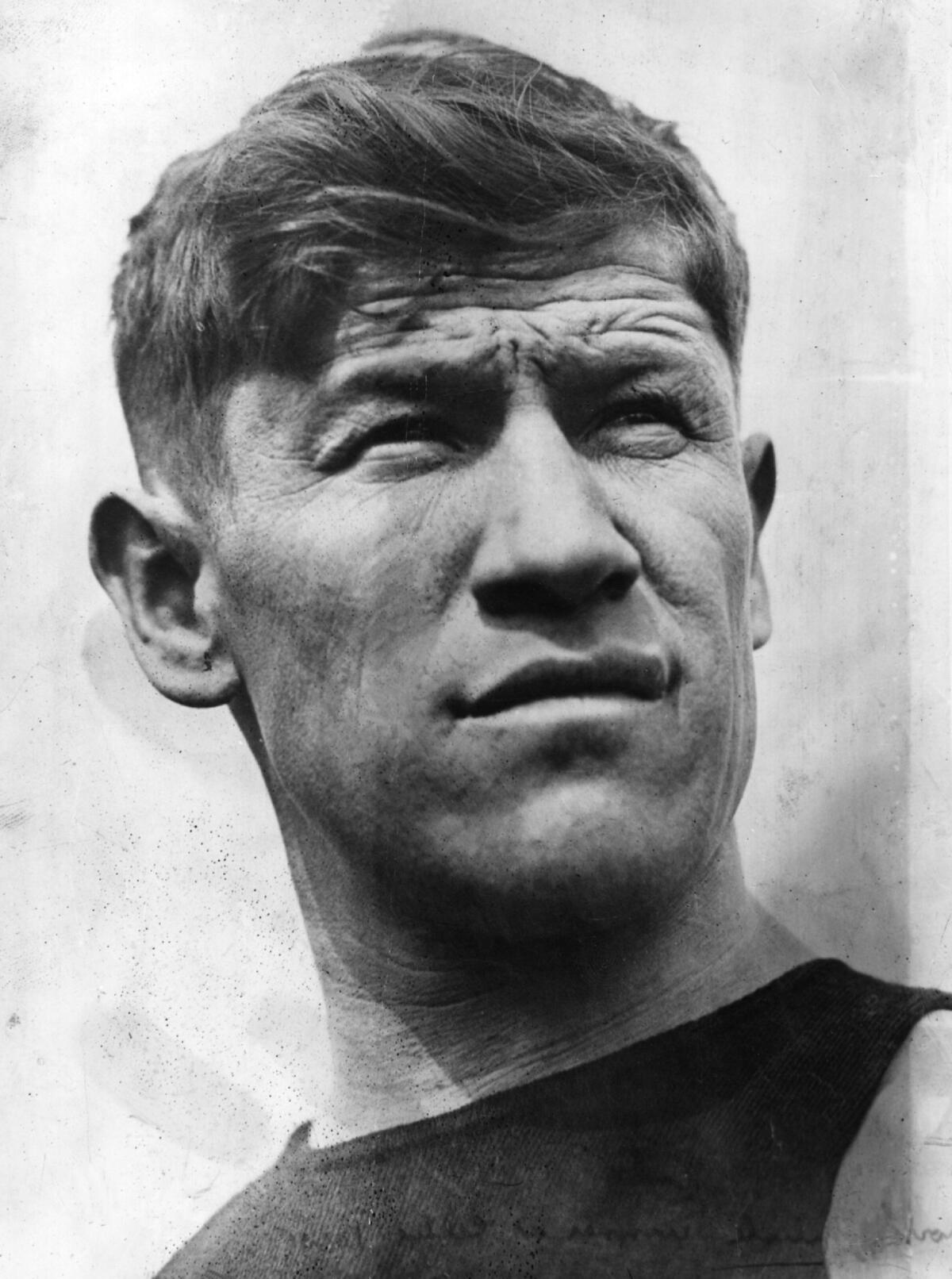
Thorpe, a gold medalist at the 1912 Stockholm Olympic Games, was called "the greatest athlete in the world" by Sweden's King Gustav V. Reportedly, Thorpe replied, "Thanks, King." (Allsport) More photos
The town, which has appealed, is now in a defensive crouch.
"People in this town are determined to keep our memorial, and keep the body here," said Jim Thorpe's mayor, Michael Sofranko. "We've done nothing wrong. We've done nothing but honor Jim Thorpe all these years."

The grave site, a red granite mausoleum, rests on mounds of soil from Oklahoma and from Stockholm's Olympic stadium, where Thorpe won gold medals in the decathlon and pentathlon in 1912. James Francis Thorpe is buried in his favorite white buckskin jacket along with a rosary.
The memorial overlooks a grassy slope featuring statues saluting his varied athletic career. Tributes are inscribed on the monuments and mausoleum, including a comment to Thorpe from King Gustav V of Sweden at the medal ceremony: "Sir, you are the world's greatest athlete." (Thorpe supposedly replied, "Thanks, King.")
At Anne Marie Fitzpatrick's gift shop downtown, a sign on a glass jar stuffed with cash reads "Keep Jim Thorpe In Jim Thorpe." Fitzpatrick has set up several donation jars around town to raise money for the appeal.
"He's been here 59 years, and we're not about to give him up," Fitzpatrick said as she stood sentinel over the jar next to the cash register.
Fitzpatrick, 72, was in grade school when Mauch Chunk and East Mauch Chunk merged in 1954 to form Jim Thorpe, Pa. For years, she's helped organize an annual Jim Thorpe birthday ceremony in May at the memorial. Events include an Olympic torch run by local high school athletes, known as the Olympians.
We are all set to bury Dad in Oklahoma and then — boom! — he was gone, never to be returned."—William Thorpe, the athlete's 85-year-old son.
It is difficult for outsiders to comprehend the adoration for Thorpe from townspeople whose only connection to him is his name. Residents and private groups have raised money over the years, with a small contribution from the borough council, to erect a $60,000 statue of Thorpe throwing a discus and a $50,000 one of him running with a football. Fundraising is underway to add a baseball statue.
"The town was built around my grandpa — people revere him," said John Thorpe, 56, a grandson who lives in South Lake Tahoe, Calif. He has joined with another Thorpe grandson to fight their uncles and tribe in an effort to keep Jim Thorpe in Jim Thorpe.
Mike Koehler, 75, said the town honored his grandfather's legacy. "For God's sakes, leave him alone," he said.
John Thorpe and Koehler have traveled here for years to take part in Jim Thorpe celebrations. They point out that Oklahoma could have kept Thorpe in 1953 but passed on the chance.
According to a history compiled by the Sac and Fox Nation, Thorpe's widow and Oklahoma's governor negotiated a deal for the state to build a grave site and memorial after Thorpe's death at age 64 in Lomita, Calif. But after the Legislature approved funding, the governor abruptly changed course and vetoed it.
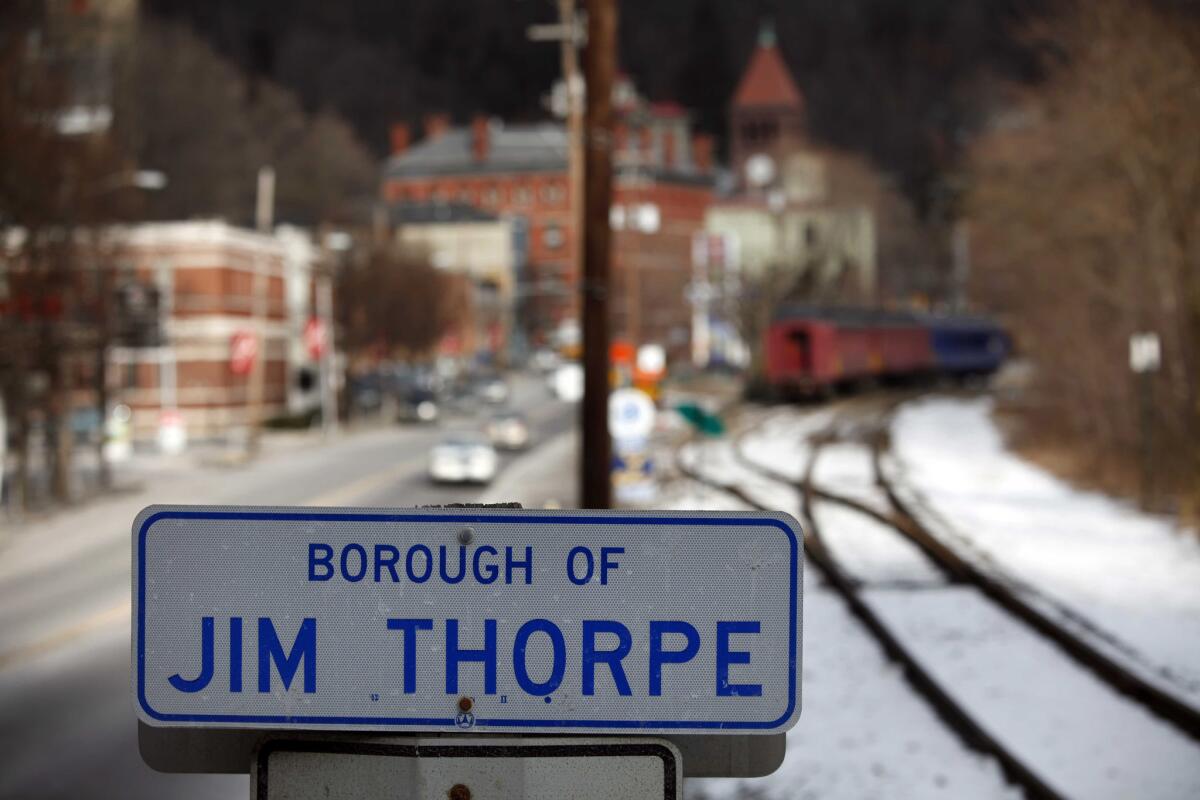
Two grandsons of Jim Thorpe side with the town. "This town was built around my grandpa — people revere him," says one. (Matt Rourke / Associated Press) More photos
Furious, Patsy Thorpe began, in the words of William Thorpe, "shopping my dad's body around the country."
She traveled to Philadelphia, where she tried and failed to persuade the commissioner of the National Football League to pay for a grave site and memorial. Thorpe played pro football and was the NFL's first president.
William Thorpe said his stepmother also failed to enlist Carlisle, Pa., home of Carlisle Indian Industrial School, where Thorpe excelled in football and track (the teams were called the Indians). He was sent there at age 16 by his father to learn a trade.
While in Philadelphia, Patsy Thorpe saw a news story about Mauch Chunk and East Mauch Chunk holding "nickel-a-week" fundraisers to save the depressed towns. She contacted town leaders and negotiated the deal that brought the towns a new name and Jim Thorpe's body.

Thorpe was voted the greatest athlete of the first half of the 20th century by an Associated Press poll in 1950. In his prime, his fame was comparable to that of quarterback Peyton Manning or Olympic swimmer Michael Phelps today, minus the multimillion-dollar contracts and lucrative endorsement deals.
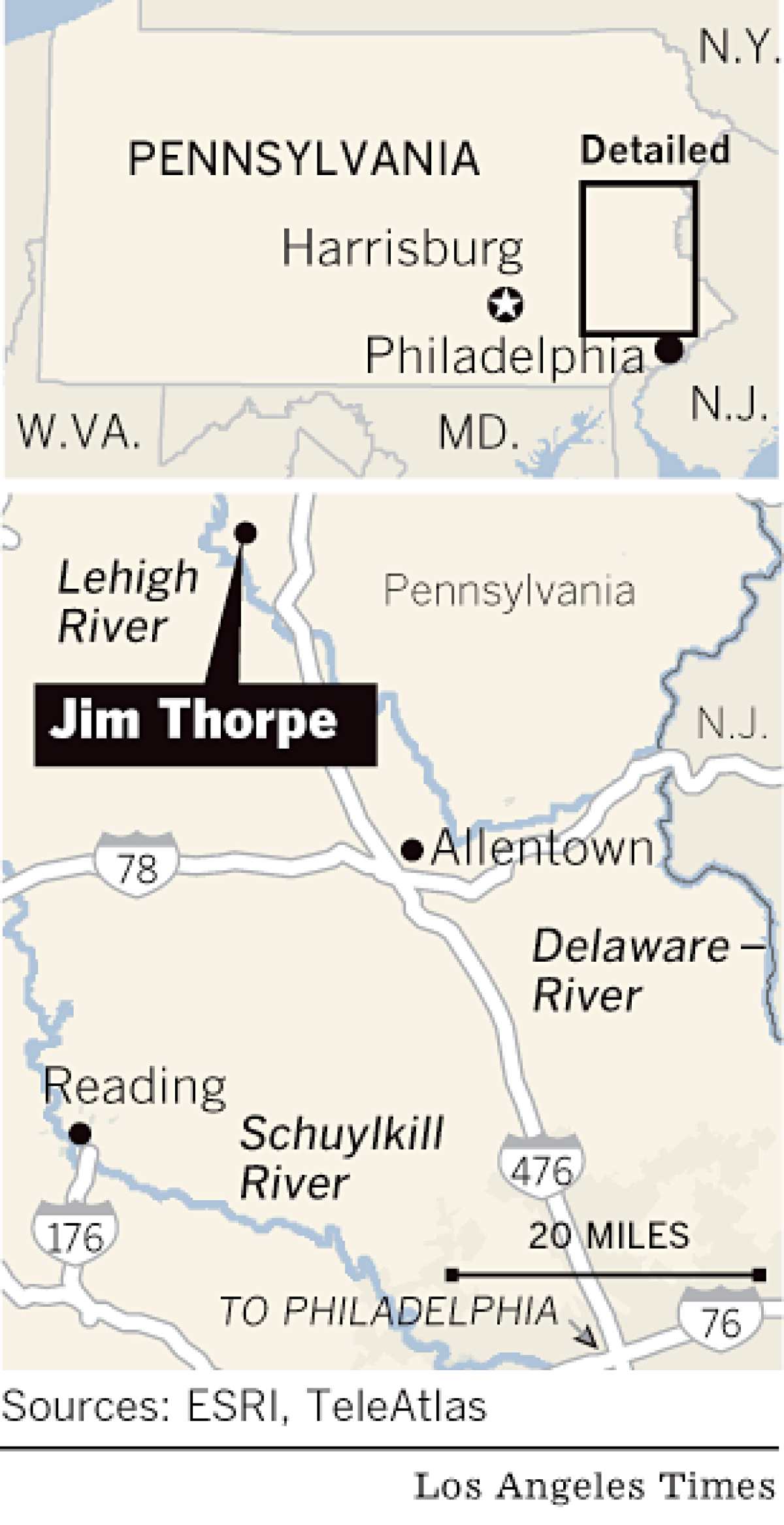
Thorpe's parents were both half-white and half-Indian, and he was raised as an Indian named Wa-tho-huk, or Bright Path. He endured ridicule and patronizing comments over his Indian heritage for most of his life.
Visitors to Jim Thorpe's tiny town hall can request a photocopy of the notarized, three-page contract between the widow and the towns signed May 19, 1954, one day after voters approved the deal. The typewritten contract stipulates that neither the widow nor her heirs "will remove or cause to be removed the body of her said husband."
Mayor Sofranko said that provision would expose the town to another lawsuit if it were to return Thorpe to Oklahoma.
William Thorpe said Thorpe's sons and tribe had every right to say where his father is buried because Thorpe repeatedly told family members he wanted to be buried in his native state. If he does get his father back, he said, he'll arrange for around-the-clock security.
The current memorial is a tourist attraction, William Thorpe said. William, of Arlington, Texas, and his brother Richard, 79, who lives in Oklahoma but not on the reservation, are the only survivors among Jim Thorpe's eight children.
The Sac and Fox Nation, in a statement on the website jimthorperestinpeace.com, said: "Our tribesman, Jim Thorpe ... did not choose to be so far away from his family.... His children are here. His memories began here. His people are here. His heart was here. Let this father come home to his children."
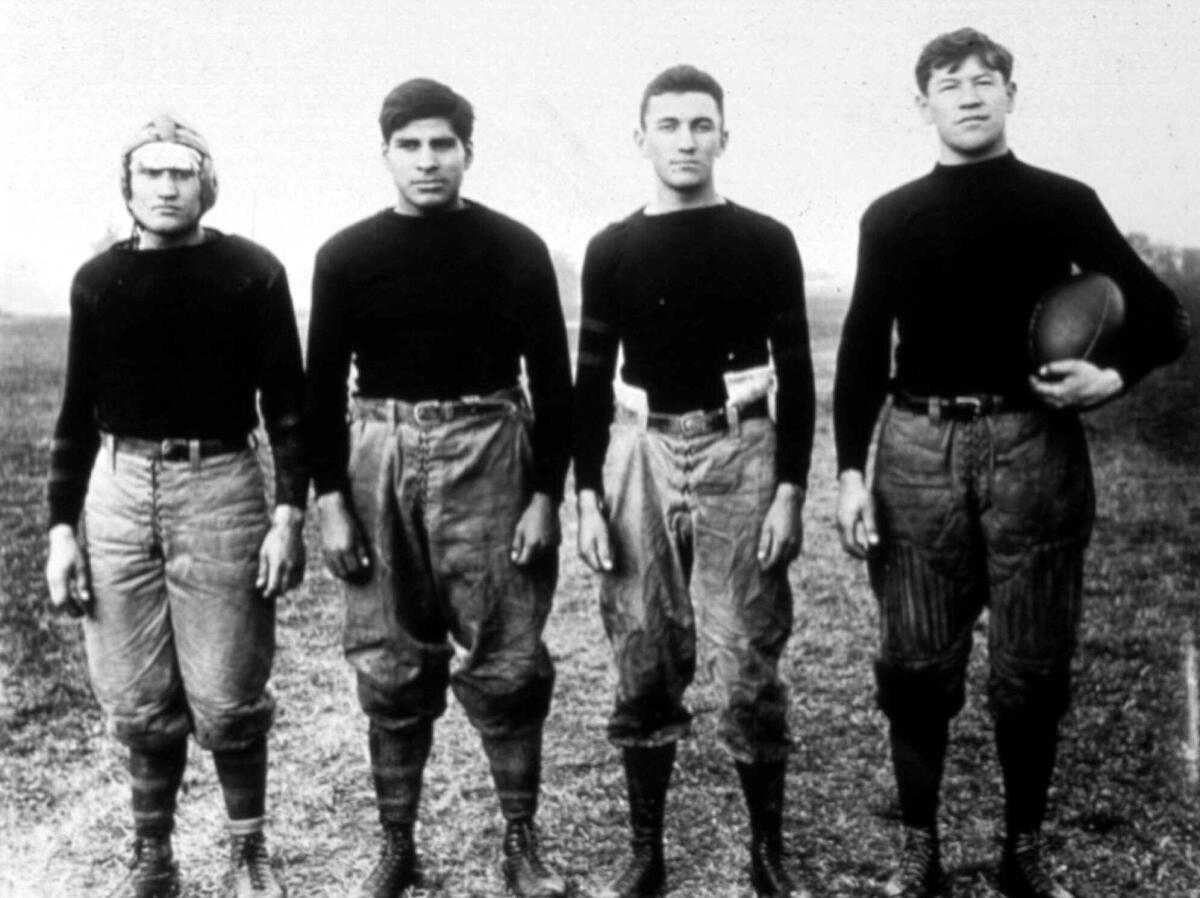
Thorpe, far right, played football with the Carlisle Indian Industrial School in Carlisle, Pa. (The Heard Museum) More photos
Nestled in deep green gorges in the Lehigh Valley, Jim Thorpe, population 4,800, is a picturesque collection of Federalist and Greek Revival mansions. It features a lively historic district, the mansions of Pennsylvania railroad barons Asa Packer and Harry Packer, an old railroad and stately churches.
"We don't want him to be a tourist draw. We want to honor him," shop owner Fitzpatrick said.
Michelle Klock, a teacher, brought her photography class to the memorial on a recent morning. She was torn by the lawsuit, and by the realization that Thorpe had no say in where he was buried.
"They should just resolve it one way or the other, and let the poor man rest in peace," Klock said.
William Thorpe said the only place his father would rest in peace was on tribal land in Oklahoma.
Follow David Zucchino (@davidzucchino) on Twitter
Follow @latgreatreads on Twitter
More great reads
Cockroach farms multiplying in China
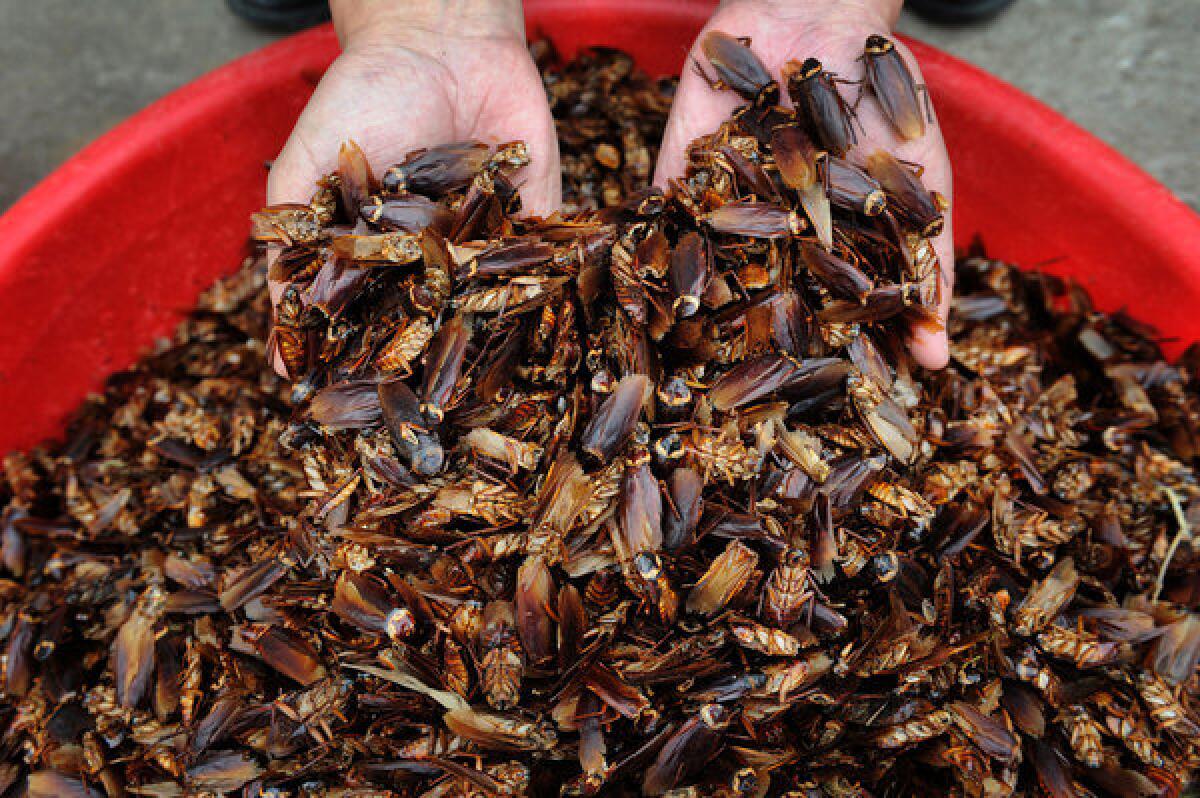
People laughed at me when I started, but I always thought that cockroaches would bring me wealth."
Ousted courthouse vendor is no longer a no-ware man

I eat up the years like I eat popcorn. ... I don't feel old.".
Sign up for Essential California
The most important California stories and recommendations in your inbox every morning.
You may occasionally receive promotional content from the Los Angeles Times.
